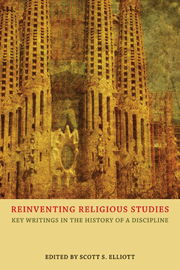Book contents
- Frontmatter
- Contents
- Introduction
- 1 For such a time as this: the Council of Societies for the Study of Religion, 1969–2009
- Part I Inventing and reinventing the field of religious studies
- Part II Method and theory in religious studies
- Part III Teaching religion
- 14 Confessions of a former establishment fundamentalist
- 15 Confessing away the soul with the sins, or the risks of Uncle Tomism among the humanists: a reply to Robert Bellah
- 16 Criteria for organizing the introductory course in religion
- 17 Teaching about religion at the state university: taking the issue seriously and strictly
- 18 Teaching about religion at the state university: a reply
- 19 Teaching about religion at the religiously affiliated university: taking the issue seriously and strictly—a reply to Robert Baird and Robert Minor
- Part IV Women and the bible in religious studies
- Part V Religion and religious studies in civic life
- Part VI Religious studies and identity politics
- Part VII Islam and 9/11
- Bibliography
- Acknowledgments
- Index
17 - Teaching about religion at the state university: taking the issue seriously and strictly
from Part III - Teaching religion
- Frontmatter
- Contents
- Introduction
- 1 For such a time as this: the Council of Societies for the Study of Religion, 1969–2009
- Part I Inventing and reinventing the field of religious studies
- Part II Method and theory in religious studies
- Part III Teaching religion
- 14 Confessions of a former establishment fundamentalist
- 15 Confessing away the soul with the sins, or the risks of Uncle Tomism among the humanists: a reply to Robert Bellah
- 16 Criteria for organizing the introductory course in religion
- 17 Teaching about religion at the state university: taking the issue seriously and strictly
- 18 Teaching about religion at the state university: a reply
- 19 Teaching about religion at the religiously affiliated university: taking the issue seriously and strictly—a reply to Robert Baird and Robert Minor
- Part IV Women and the bible in religious studies
- Part V Religion and religious studies in civic life
- Part VI Religious studies and identity politics
- Part VII Islam and 9/11
- Bibliography
- Acknowledgments
- Index
Summary
Because of the public and tax-supported nature of the state university, it is inappropriate to teach religion there. As an institutional arm of a pluralistic society, the state university is expected to limit itself to teaching about religion. Yet, the study of religion in the United States did not originate in state institutions but under the aegis of theological seminaries and the divinity schools connected with major private universities. Thus, professors who found themselves teaching in state universities were often trained in the methods and atmospheres of private and parochial institutions of higher learning. As a result, it is easy to forget the limitations of the public university, which has more in common with the public elementary and secondary school system. On the other hand, for many it may be more fun, fulfilling, and rewarding to do what is constitutionally inappropriate at the state university—to teach religion.
There are a number of reasons why this is so. The first is that most people who enter the scholarly profession of religious studies have done so for reasons other than merely to teach about religions. They have somehow felt that the study of religion is existentially relevant. It is not merely the learning of more information, but the doing of something to the individual. Often for the person entering the field the study has been a part of some existential search, and that search became the motivation for religious study.
- Type
- Chapter
- Information
- Reinventing Religious StudiesKey Writings in the History of a Discipline, pp. 103 - 110Publisher: Acumen PublishingPrint publication year: 2013



